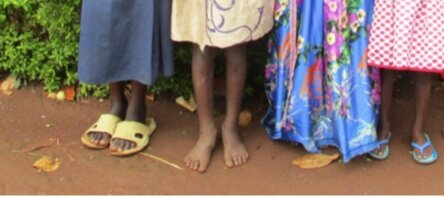Chris and Charity at home.
Amid the pandemic and lockdown in Uganda, many orphanages have taken an unusual step; to send children home to their families. Orphanages are cash strapped, and with schools closed, the scores of children who are in orphanages to access free education, no longer have a reason to stay.
This situation is playing out in Uganda and around the world. In Ukraine, nearly 40,000 children (almost half those living in orphanages) were sent home to their families over two days, and we are hearing similar reports around the world.
For many children, these are happy reunions. But with no safety checks and little to no support, this sudden move has put children at risk, and placed an incredible strain on impoverished families in a time of crisis.
In this time of need, we're working to assess families, and support safe and successful reunifications.
Two children we are helping are Charity and Chris, whose orphanage sent them home to their family. They've lived in an orphanage for nearly five years due to the crushing poverty at home. The conditions are so terrible in the institution that Charity has routinely run away, running across several kilometers to be with her mother. But as bad as it is in the orphanage, there is no way for Charity to go to school and get other necessities at home.
Charity and Chris's mom is homeless. She lost her house and land when her husband died, and she and her other children live in a corrugated iron shelter in exchange for guarding the property. The children don't go to school and instead live and work on the streets to earn a few coins to feed the family. It's a dire situation, but not hopeless.
Charity and Chris's mom is committed to caring for her children and has stood by them, doing her best against incredible odds. And she and Charity and Chris want to live together as a family.
With your support, we're providing emergency food and medical care to Charity, Chris, and their mom and siblings. We're beginning to plan for a new home, a business, and emergency scholarships when schools reopen. With support, Charity and Chris can remain with the mother, and look forward to growing up in a safe and loving family even after the pandemic is over.












